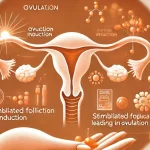The 13 week ultrasound: a difficult choice during your pregnancy
Welcome to our blog post about the 13-week ultrasound, an important moment during your pregnancy. This blog offers you detailed information about what the 13 week ultrasound entails, what it can do for you and how it differs from the 20 week ultrasound scan.
What is the 13 week ultrasound?
The 13 week ultrasound is an ultrasound examination that is performed around the 13th week of your pregnancy. The primary purpose is to check for physical abnormalities in your baby.
Investigate physical abnormalities
During this ultrasound, the physical development of your baby is specifically examined in order to identify any abnormalities at an early stage.
Your choice and counseling by our midwives
The choice for the 13-week ultrasound is completely up to you. During your first appointment with us you will receive detailed information and discuss the considerations with us.
When is the 13 week ultrasound performed?
The 13 week ultrasound takes place between 12+3 and 14+3 weeks of pregnancy.
How does the ultrasound proceed?
A sonographer will perform an ultrasound of your baby, which takes about 30 minutes. This process is safe and painless.
Receipt of the result
You will receive the results of the ultrasound immediately afterwards. In most cases no abnormalities are found.
Follow-up research
If possible abnormalities are detected, you can opt for follow-up testing for more clarity.
Costs and IMITAS Study
The 13-week ultrasound and the preliminary consultation are free. The ultrasound is part of the IMITAS study, which investigates its effectiveness. This also means that you must give permission to participate in this scientific research.
Differences between the 13 week ultrasound and the 20 week ultrasound
Although the 13 and 20 week ultrasound are both aimed at detecting physical abnormalities in your baby, there are some important differences:
- Time of day: The 13-week ultrasound takes place earlier in the pregnancy, which allows early detection of certain abnormalities.
- Level of detail: The 20 week ultrasound is performed later when your baby is more developed, which allows for more detailed examination of the anatomy.
- Type of deviations: Some abnormalities may already be visible at the 13-week ultrasound, while other abnormalities can be better assessed during the 20-week ultrasound.
- Decision: The information obtained from the 13-week ultrasound can help with early decision-making about the pregnancy.
Conclusion
Choosing the 13-week ultrasound is a personal decision that depends on your wishes and needs during your pregnancy. It is important to consider all information and advice to make the best choice for you and your baby. For more information, visit www.pns.nl and discuss the options with us during the first appointment.








